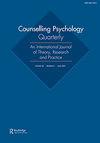亚裔美国女大学生的身体羞耻感:性物化、内化种族主义和种族认同力量的作用
IF 1.5
Q3 PSYCHOLOGY, APPLIED
引用次数: 4
摘要
根据客体化理论的原则,性客体化和种族主义是强大的社会文化力量,会对有色人种女性的心理健康产生有害影响,本研究考察了性客体化和三种形式的内化种族主义(即自我消极、软弱刻板印象、外表偏见)与亚裔大学女性身体羞耻感的纵向联系(N=146)。种族认同强度是身体形象文献中的一个理论保护因素,被认为是假设纵向联系的调节因素。结果表明,在时间1测量的性客体化和自我否定与在时间2测量的身体羞耻感具有显著且正的双变量关联。然而,当体重指数(BMI)作为协变量时,这些变量不再预测身体羞耻感。在预测身体羞耻感时,外貌偏见和种族认同强度之间存在显著的交互作用。具体而言,高种族认同强度加剧了外表偏见对亚裔女性身体羞耻感的不利影响,而低种族认同强度则缓冲了这种影响。这一发现与种族认同强度作为有色人种女性身体形象发展的保护因素的理论观点相矛盾。讨论了实践意义和未来的研究方向。本文章由计算机程序翻译,如有差异,请以英文原文为准。
Body shame among Asian American college women: the roles of sexual objectification, internalized racism, and ethnic identity strength
ABSTRACT Informed by objectification theory’s tenet that sexual objectification and racism are powerful sociocultural forces that perniciously impact women of color’s mental health, the present study examined the longitudinal links of sexual objectification and three forms of internalized racism (i.e. self-negativity, weakness stereotype, appearance bias) with body shame among Asian American college women (N = 146). Ethnic identity strength, a theorized protective factor in body image literature, was examined as a moderator for the hypothesized longitudinal links. Results indicated that sexual objectification and self-negativity measured at Time 1 had significant and positive bivariate associations with body shame measured at Time 2. However, these variables no longer predicted body shame when body mass index (BMI) was included as a covariate. A significant interaction between appearance bias and ethnic identity strength emerged in predicting body shame. Specifically, high ethnic identity strength exacerbated the detrimental effect of appearance bias on Asian American women’s body shame, whereas low ethnic identity strength buffered this effect. This finding contradicts theoretical views of ethnic identity strength as a protective factor in women of color’s body image development. Practice implications and future research directions are discussed.
求助全文
通过发布文献求助,成功后即可免费获取论文全文。
去求助
来源期刊

Counselling Psychology Quarterly
PSYCHOLOGY, APPLIED-
CiteScore
6.20
自引率
6.70%
发文量
30
期刊介绍:
Counselling Psychology Quarterly is an international interdisciplinary journal, reporting on practice, research and theory. The journal is particularly keen to encourage and publish papers which will be of immediate practical relevance to counselling, clinical, occupational, health and medical psychologists throughout the world. Original, independently refereed contributions will be included on practice, research and theory - and especially articles which integrate these three areas - from whatever methodological or theoretical standpoint. The journal will also include international peer review commentaries on major issues.
 求助内容:
求助内容: 应助结果提醒方式:
应助结果提醒方式:


